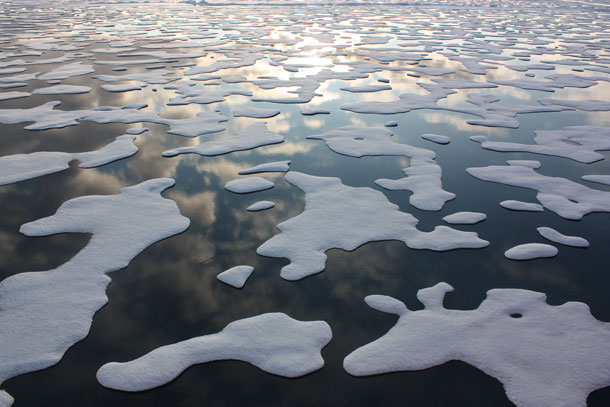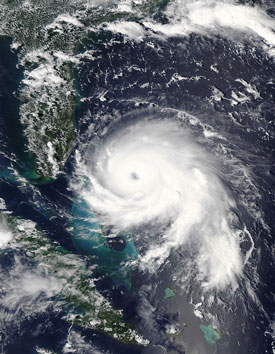Beyond the Headlines
Air Date: Week of September 27, 2019

2019 is second on the record for lowest Arctic sea ice levels, according to NASA.
In this week's trip beyond the headlines, Peter Dykstra joins Host Steve Curwood to take a look at recurring devastation left behind by storms, and how quickly the media moves on from covering them. Then, the two discuss which nations are on track to meet their 2015 Paris Climate Accord goals and which are falling behind. Next Peter and Steve talk about a new law in Florida that could have a chilling effect on environmental challenges to projects. Finally, the two discuss the 2019 Arctic ice cover minimum as well as reminisce about a famous television evangelist who believed that he could pray a storm away.
Transcript
CURWOOD: It’s Living on Earth, I’m Steve Curwood.
Let's turn now to Peter Dykstra. He's an editor at Environmental Health News, that's EHN.org and DailyClimate.org. On the line now from Atlanta to talk to us about what's beyond the headlines. Hey there, Peter, what do you got for us today?
DYKSTRA: Well, hi, Steve. This isn't beyond the headlines as much as it really ought to be in the headlines right now. It's been two years since Hurricane Harvey tried to drown the Houston area. Hurricane Maria brought absolute misery to Puerto Rico. These places have been hit again. Imelda wasn't even a hurricane, and it dropped huge amounts of rain, up to 40 inches in some parts of the Houston area. And in a still-recovering Puerto Rico, it's been grazed by another tropical storm that also brought heavy rains.
CURWOOD: And of course, I guess we're not talking about the Bahamas are we, anymore?
DYKSTRA: No, we're not talking about the most recent one. Two of the most populous islands in the Bahamas were absolutely leveled. And, even though the structures have disappeared there, so has the news coverage. We still don't know the death toll in the Bahamas. We still don't know the death toll from Maria two years ago.
CURWOOD: Indeed. What do you suppose is behind this? Peter, why aren't we hearing this on the news or seeing it in the newspaper?
DYKSTRA: Well, it's pretty simple. The damage is going to last for years. Our attention span does not last for years. Those horrific scenes from the Bahamas were on our TV screens. They're now gone from our TV screens. We’re paying attention again to the Trump scandal du jour. And those stories may be important, but 20 years from now, they'll be forgotten, while another warning about climate change went unheeded, and we'll be paying the price.
CURWOOD: And of course, the scientists keep ratcheting up the difficulties that we're going to face with climate disruption, like those storms.

Hurricane Dorian devastated the Bahamas in September of 2019. (Photo: NASA, Wikimedia Commons, Public Domain)
DYKSTRA: Yeah, the information about melting ice has gotten worse. There's a new report that lists the best actors and the worst actors in terms of meeting the reductions goals committed to in the 2015 Paris Climate Accord. And the winner is, the best nation, the best behaved is, ladies and gentlemen, Morocco.
CURWOOD: Uh. Okay, I don't think Morocco is a leading culprit of CO2 emissions on the planet, though.
DYKSTRA: No, but to their credit, they've just brought a huge solar array online. There are a couple of really big CO2 emitters that are on the good list as well, India and the European Union.
CURWOOD: Okay, and who's at the bottom?
DYKSTRA: I'd say you'll never guess who's at the bottom, but you probably could guess who's at the bottom. It's Russia, the Saudis, and America.
CURWOOD: Of course. Hey, what else do you have for us today?
DYKSTRA: Well, there's a new law in Florida that says if you bring a developer to court over a controversy, whether it's mining or housing development, or any big environmental compromising project, and you lose in court, you have to pay the developer’s legal fees and all the court fees. Environmentalists have called this quote, "a mortal blow to growth management." It's already a lopsided financial battle between developers, and whether it’s citizens groups or nonprofit conservation groups, this law would make it more lopsided in one of America's most lopsided climate states, which is now more lopsided.
CURWOOD: indeed. Hey, what do you see when you look back in the annals of history?
DYKSTRA: Well, we may make history this week. Mid September is the standard period for Arctic ice cover hitting its summer seasonal low. NASA has an animation showing how we did in 2019. And it's not pretty. But wait, there's more! There's an anniversary of a potential climate fix.
CURWOOD: And that is?
DYKSTRA: Hurricane Gloria back in 1985, on September 25, took an abrupt turn northward. It was headed straight for Virginia Beach, Virginia. Virginia Beach was spared when the hurricane turned north. And the Reverend Pat Robertson went on TV to take credit for praying Gloria away from his Virginia Beach headquarters.
CURWOOD: But, where did the storm wind up?
DYKSTRA: It made landfall in Long Island, went through to Connecticut and took seven souls.
CURWOOD: Hm. Hey, thanks, Peter. Peter Dykstra is an editor with Environmental Health News. That's EHN.org and DailyClimate.org. And we'll talk to you again real soon.
DYKSTRA: All right, Steve, thanks a lot. Talk to you soon.
CURWOOD: And, there's more on these stories, as well as a link to the animation of the loss of ice that was put together by NASA, at our website LOE.org.
Links
The New York Times : “Tropical Storm Karen Could Loop Toward the Bahamas and Florida”
National Geographic : “Climate change report card: These countries are reaching targets”
Living on Earth wants to hear from you!
Living on Earth
62 Calef Highway, Suite 212
Lee, NH 03861
Telephone: 617-287-4121
E-mail: comments@loe.org
Newsletter [Click here]
Donate to Living on Earth!
Living on Earth is an independent media program and relies entirely on contributions from listeners and institutions supporting public service. Please donate now to preserve an independent environmental voice.
NewsletterLiving on Earth offers a weekly delivery of the show's rundown to your mailbox. Sign up for our newsletter today!
 Sailors For The Sea: Be the change you want to sea.
Sailors For The Sea: Be the change you want to sea.
 The Grantham Foundation for the Protection of the Environment: Committed to protecting and improving the health of the global environment.
The Grantham Foundation for the Protection of the Environment: Committed to protecting and improving the health of the global environment.
 Contribute to Living on Earth and receive, as our gift to you, an archival print of one of Mark Seth Lender's extraordinary wildlife photographs. Follow the link to see Mark's current collection of photographs.
Contribute to Living on Earth and receive, as our gift to you, an archival print of one of Mark Seth Lender's extraordinary wildlife photographs. Follow the link to see Mark's current collection of photographs.
 Buy a signed copy of Mark Seth Lender's book Smeagull the Seagull & support Living on Earth
Buy a signed copy of Mark Seth Lender's book Smeagull the Seagull & support Living on Earth

